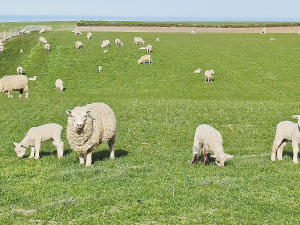Salmonellosis Surge: MPI reports rising cases in New Zealand cattle
Salmonellosis is a serious disease in cattle.
 Farmers are being urged to be on lookout for diarrhoea and sudden death in their ewes as reported cases of Salmonella Hindmarsh rise.
Farmers are being urged to be on lookout for diarrhoea and sudden death in their ewes as reported cases of Salmonella Hindmarsh rise.
Beef + Lamb NZ is advising farmers in Southland, Taihape and Hawke’s Bay to be on the lookout for diarrhoea and sudden death in their ewes as reported cases of Salmonella Hindmarsh rise.
B+LNZ’s senior advisor animal welfare and biosecurity Will Halliday is recommending that farmers be on guard for signs of the deadly disease, which is likely to be caused by weather-related stress.
He says vets in Taihape and Hawke’s Bay are reporting an increased frequency of significant outbreaks of Salmonella Hindmarsh in mixed-age ewes, but there are also reported outbreaks in Southland.
Salmonella Hindmarsh is triggered by stress-induced changes to the gut bacteria allowing salmonella to proliferate in the gut. Large numbers of bacteria are passed in the faeces contaminating pasture and acting as a source of infection for other sheep. In most cases, carrier sheep are the source of the infection.
Halliday says some ewes die before they develop any clinical signs, so the first sign of a problem might be the discovery of dead ewes.
“Some will have evidence of khaki-coloured watery scour. Clinical signs include depression, lethargy, not eating and mild to severe diarrhoea. Affected ewes may die within 24–48 hours.”
Halliday says a vaccine is available for the prevention of the disease, but farmers need to seek advice from their vet about the best management strategies for their specific operation. He adds that it is important to remember that Salmonella Hindmarsh is a zoonotic disease, meaning it can be passed to humans and cause illness.
“Washing hands thoroughly after handling livestock and wearing protective clothing can help stop the transmission of this nasty disease.”
Halliday encourages farmers seeing any signs of diarrhoea or sudden death in their ewes to call their vet and put a management plan in place to prevent further losses.
As guests gathered on what is known as the Speaker's Lawn - a beautifully manicured patch of grass behind the main buildings of Parliament - to mingle and enjoy a lamb chop to celebrate National Lamb Day, the mood was very much upbeat.
Global dairy prices are on a roll, recording a fourth consecutive jump on the Global Dairy Trade (GDT) auction this year.
Booming primary sector exports are helping lift earnings for farm service providers.
The world is waking up to the disadvantages of carpets derived from petrochemicals, creating opportunities for New Zealand strong wool.
The red meat sector finds itself in "a very rare set of circumstances", says Federated Farmers meat and wool industry chair Richard Dawkins.
Controls on the movement of fruit and vegetables in the Auckland suburb of Mt Roskill have been lifted.

OPINION: Here w go: the election date is set for November 7 and the politicians are out of the gate…
OPINION: ECan data was released a few days ago showing Canterbury farmers have made “giant strides on environmental performance”.